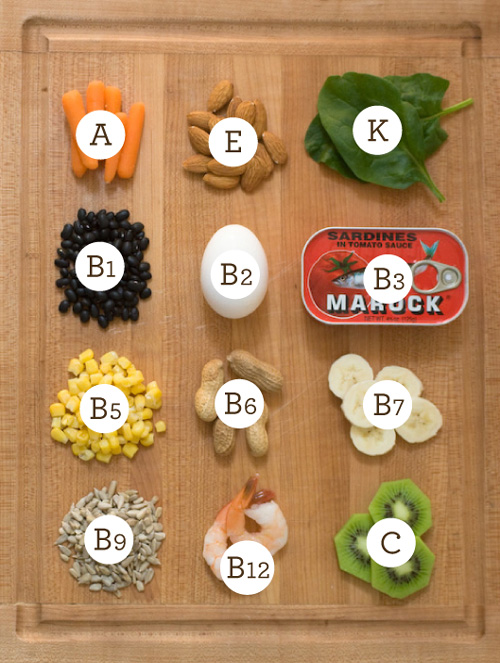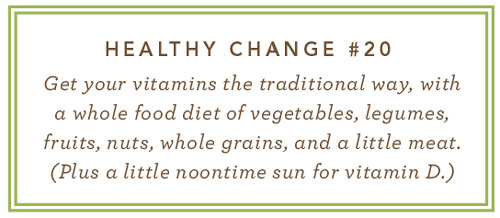Vitamins

The quick answer: As illustrated above, whole foods are the best source of vitamins.
_____________________________________________________________________
Vitamin History
The most exciting nutrition news a century ago was the discovery of vitamins. It seemed as though we had discovered the essence of life in these potent molecules. Some dreamed of a day when the pleasure of cooking and dining could be replaced with quickly swallowed pills.
There arose an industry, very loosely regulated, to manufacture synthetic vitamins in pill form. With clever marketing most every home soon had a collection of vitamin pills. Wiser heads noted that it might be healthier to get your vitamins from real food, rather than the heavily marketed pills.
So scientific studies were launched to provide the lacking evidence. Unfortunately, those pills were found to do more harm than good. A 2008 N. Y. Times article titled “News Keeps Getting Worse for Vitamins” provides an excellent summary.
Vitamin Insufficiency
Everyone knows about ancient sailors and scurvy from vitamin C deficiency. Few realize that most Americans live in a condition of “vitamin insufficiency” and that this may play a role in the diseases of our time.
Vitamin A: In a past post Vitamin A we discussed the problem of vitamin A insufficiency. Vitamin A isn’t just necessary for good vision, it’s a potent antioxidant essential to prevention of premature aging. Vitamins C and E are also antioxidants.
Vitamin D: In the post Let The Sun Shine we discussed the importance of vitamin D, more a hormone really but important to the prevention of certain cancers and other diseases. A recent Northwestern University study found that men with the lowest vitamin D had a 266% greater risk for the aggressive prostate cancer most likely to kill.
Vitamin K-2: K-2 is essential to bone health and widespread insufficiency isn’t discovered until it’s too late. Read more about vitamin K-2 and its role in bone health here.
Are Vitamin Pills Ever Needed?
Here’s the short answer: sometimes, if prescribed. Older people can become deficient in vitamin B-12—especially vegans as B-12 is found in animal products—a difficult to diagnose condition with serious consequences. There is solid evidence that neurotube birth defects (NTDs) are reduced with folate pills. Vitamin D pills help people who chronically get insufficient sunshine. Other examples of proven benefit exist for certain medical conditions. So there is a place for pills and your doctor is the best person to consult. But the starting point is to eat a healthy and varied whole foods diet.

Please comment: It seems that pills aren't the shortcut to health and longevity—a healthy Word of Wisdom diet is still needed. It took most of the 20th century to learn that. Please share your experience.

 Monday, May 5, 2014 at 12:33PM
Monday, May 5, 2014 at 12:33PM
Reader Comments (1)
This was really Higgins for the health these beans you would eat at morning and at night before sleep thanks for sharing.